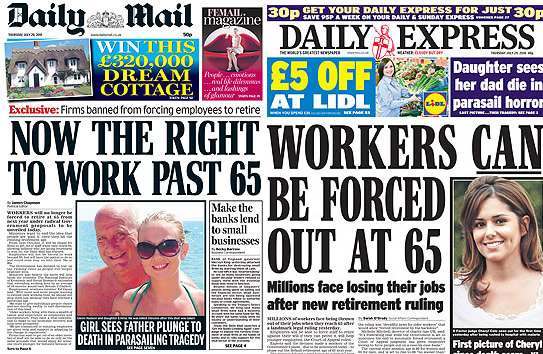Working Past 65 Is Not A Right For Partners But Is A Media Scare sTory
 EMPLOYMENT law news now, readers, The Express leads with news that “Workers can be forced out at 65”.
EMPLOYMENT law news now, readers, The Express leads with news that “Workers can be forced out at 65”.
Or as the Mail puts it on its front page:
“NOW THE RIGHT TO WORK PAST 65.”
Says the Mail:
Workers will no longer be forced to retire at 65 from next year under radical Government proposals to be unveiled today…
From next October, it will be illegal for firms to get rid of staff when they reach 65, allowing millions who are facing retirement to stay on, the Daily Mail has learned.
Says the Express:
MILLIONS of workers face being thrown out of their jobs when they reach 65 after a landmark legal ruling yesterday. Employers will be able to force staff to retire against their will if they can prove it will help younger employees, the Court of Appeal ruled.
The Express’s featured case is based on one Mr Leslie Seldon. He was forced to retire his role as partner at Clarkson Wright and Jakes, in Orpington, Kent, a law firm where he had worked as a civil litigator for 35 years. His removal was “in line with his partnership agreement”.
The Times tells us that the matter went to an “Employment Appeal Tribunal, which agreed that it could be lawful to force partners to leave solely on grounds of age to give younger solicitors a realistic prospect of partnership”.
And Mr Seldon did not appear to lose his role as an employee, something the Express fails to make clear.
Rachel Dineley, employment partner and head of the Diversity and Discrimination Unit at law firm Beachcroft LLP tells us:
“The decision will be of particular interest to professional services firms and other partnerships. It takes a conservative line to what is an increasingly important issue for many organisations.
“There has been a lot of controversy about the provision in regulation 30 of the Employment Equality (Age) Regulations 2006, which allows for compulsory retirement of employees at the age of 65 or above… The so called ‘default retirement age’ is currently under review and the coalition government is committed to its ultimate abolition.
“However, this rule does not apply to partners, and the Seldon case specifically deals with partners and is plainly most relevant to all non employees.
“Retirement age is a tricky business for all organisations. For the time being employers can still fairly retire employees at or after 65 if they follow the prescribed procedure. This case tells us what they may need to do in relation to non-employees, and, looking ahead, what they will need to do in relation to employees when the default retirement age comes to be abolished.”
So. The ruling against Mr Seldon, who wanted to keep his role but was not allowed to do so, is undoubtedly a blow for him is not a blow for all workers who want to stay on…
Posted: 29th, July 2010 | In: Money Comment (1) | TrackBack | Permalink


